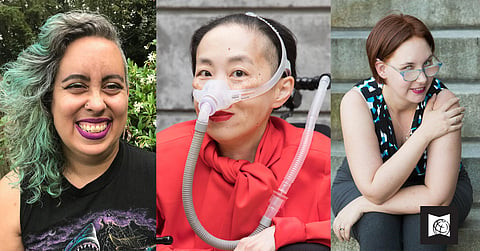Disabled Writers Get Powerful, Political, and Personal at SPL Virtual Event for New Anthology 'Disability Visibility'
by Chamidae Ford
On a Tuesday evening, people from all over the world gathered in a virtual room to watch a discussion on the new anthology, Disability Visibility: First-Person stories from the Twenty-First Century.
Hosted by the Seattle Public Library, the discussion featured Alice Wong, a disabled activist, media maker and founder of the Disability Visibility Project. She was joined by Leah Lakshmi Piepzna-Samarasinha and Elsa Sjunneson, both disabled writers with work featured in the anthology.
The discussion jumped from politics to COVID-19 to personal stories of grief, anger, and hope. They touched on many topics within the disability community, from gatekeeping to the beauty of having a safe space. The flow of the conversation seemed to parallel the three words Wong used to describe the anthology: powerful, political, personal. "[The anthology] will force people to reflect," Wong said.
Described by Piepsna-Samarasinha as "the world's greatest champion of all disabled writers," Wong created Disability Visibility with a clear goal and dedication to her craft.
"I poured myself into this and made this, hopefully, a gift for the world," said Wong. "This really is a reflection of a lot of what I care about. The issues, the kind of people I want to highlight, I was very intentional about that."
The discussion transitioned into a reading, providing the audience a sneak peek into the book's contents.
Sjunneson read a section of her beautifully raw piece, "How to Make a Paper Crane from Rage," a personal essay on her relationship with anger.
"I am a disabled woman, I have learned to suppress, to fold, to disappear. When I fold down my rage, I fold down myself," Sjunneson said.
Her essay addressed how people often do not see femininity and anger as expressions that can exist in the same space. There is an assumption femmes must project fragility and softness into the world, a stereotype that can feel impossible to escape. To Sjunneson, the paper crane represented the delicacy people want her rage to be.
One line from her piece, "because my brain and my cataracts were not lady-like enough," illuminated some of the ways her reality defies feminine expectations.
Discussing the times when people have disregarded her capabilities and believed she could not take care of herself, Sjunneson pointed out the ways people with disabilities are frequently infantilized. "There is something really horrifying about realizing that people don't see you as an adult when you are, in fact, an adult," she said.
Sjunneson has a memoir coming out fall 2021. It can be preordered here.
Piepsna-Samarasinha followed, reading a section of their piece, "Still Dreaming Wild Disability Justice Dreams at the End of the World." Piepsna-Samarasinha described many of their essays as "state-of-the-union, here's-what-I'm thinking-from-bed pieces."
The excerpt they read, poetic in its repetition of the phrase "remember when," talks about loss, pain, disappointment, and anxiety with the state of our world.
"It turns out that the end of the world is easier to read about in a book than to know how to respond to when it happens in real life," Piepsna- Samarasinha said. They continued the end-of-the-world concept saying, "It's hard to dream when you are terrified, and these are terrifying times."
Dreaming of a better future can often feel like a difficult thing for people in the disability community. Not because they don't have dreams, but rather because others don't want them to. There is an expectation from able-bodied people that people with disabilities should just appreciate the fact that their disabled bodies exist.
"We are supposed to be grateful for not dying, and it can be really hard to be, like, 'no I want more than just keeping the bare minimum. I want to dream of a liberated future,'" Piepsna-Samarasinha concluded.
The driving force behind the discussion was to embrace all the feelings that come with living with a disability. An emotion everyone kept circling back to was rage and the way we should stop fearing it.
"There is something to be said for the utility of rage," Wong said. "A lot of people say 'Oh, it's toxic, it's destructive, it's negative energy.' But you know what? For me, I thrive on it, I wield it, use it like a flaming sword."
Wong left us with a striking point on what being a person with a disability means and the importance of utilizing the voice you have.
"We are past the stage where we have to explain who we are," Wong said. "Why hold back now? We deserve it all."
You can watch the full discussion on the Seattle Public Libraries website.
Chamidae Ford is a recent journalism graduate of the University of Washington. Born and raised in Western Washington, she has a passion for providing a voice to the communities around her. She has written for The Daily, GRAY Magazine, and Capitol Hill Seattle. Reach her on IG/Twitter: @chamidaeford.
Featured image courtesy of Seattle Public Library.
Before you move on to the next story …
The South Seattle Emerald™ is brought to you by Rainmakers. Rainmakers give recurring gifts at any amount. With around 1,000 Rainmakers, the Emerald™ is truly community-driven local media. Help us keep BIPOC-led media free and accessible.
If just half of our readers signed up to give $6 a month, we wouldn't have to fundraise for the rest of the year. Small amounts make a difference.
We cannot do this work without you. Become a Rainmaker today!
Help keep BIPOC-led, community-powered journalism free — become a Rainmaker today.


